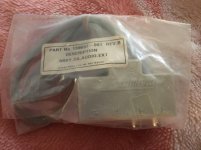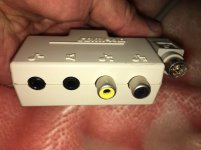gslick
Veteran Member
Mine came with an Assembly # 002319-001 / Spare # 129127-001 486DX/33 Processor Board.
It has (8x) Samsung KM44C1000AJ-8 1M x 4Bit and (4x) NEC UPD421000-70 1M x 1Bit DRAM chips for 4MB total on the processor board.
I replaced that with a different one I bought later. An Assembly # 003200-001 / Spare # 149924-001 which I think has a 486DX2-66 processor.
It has (16x) Samsung KM44C1000BJ-7 1M x 4Bit and (2x) TI TMS44460DJ 1M x 4Bit (Quad CAS) DRAM chips for 8MB total on the processor board.
It came with a Kingston KTC-9160 Memory Expansion Board. I currently have 4 SIMMs in half of the slots, A through D. Must be (2x) 8MB SIMMs and (2x) 4MB SIMMs as the system reports 32MB total (8MB on processor board, 24MB on memory expansion board).
It's been a while since the last time I did anything with it. I forgot I put an IDE/CF adapter and a 256MB CF card as a boot drive the last time I used it. Might take a while to find the EISA configuration floppies I created the last time I was using it.
I did verify that I currently have a 3Com EtherLink III Bus Master EISA (3C592) Network Adapter and an Adaptec AHA-2740A SCSI Adapter installed.
It has (8x) Samsung KM44C1000AJ-8 1M x 4Bit and (4x) NEC UPD421000-70 1M x 1Bit DRAM chips for 4MB total on the processor board.
I replaced that with a different one I bought later. An Assembly # 003200-001 / Spare # 149924-001 which I think has a 486DX2-66 processor.
It has (16x) Samsung KM44C1000BJ-7 1M x 4Bit and (2x) TI TMS44460DJ 1M x 4Bit (Quad CAS) DRAM chips for 8MB total on the processor board.
It came with a Kingston KTC-9160 Memory Expansion Board. I currently have 4 SIMMs in half of the slots, A through D. Must be (2x) 8MB SIMMs and (2x) 4MB SIMMs as the system reports 32MB total (8MB on processor board, 24MB on memory expansion board).
It's been a while since the last time I did anything with it. I forgot I put an IDE/CF adapter and a 256MB CF card as a boot drive the last time I used it. Might take a while to find the EISA configuration floppies I created the last time I was using it.
I did verify that I currently have a 3Com EtherLink III Bus Master EISA (3C592) Network Adapter and an Adaptec AHA-2740A SCSI Adapter installed.


